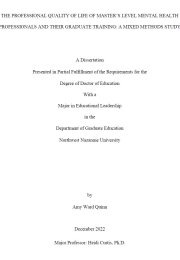- Resource Types
- Resource Languages
- Institutional Repository
 Visit the home page
Visit the home page
About Site Language
WHDL is viewable in multiple languages. Use the pull-down menu to select a language to view the site.
I changed my language, but I’m still seeing resources in the other languages?
If a resource or text has not been translated into your selected language, it will appear in the initially added language. We are always looking for help translating these resources. If you can help, contact us!
WHDL - 00018746


click to copy
Quinn, A (n.d.). The professional quality of life of master’s level mental health professionals and their graduate training: A mixed methods study .
Quinn, AmyThe professional quality of life of master’s level mental health professionals and their graduate training: A mixed methods study . , n.d.
Quinn, AmyThe professional quality of life of master’s level mental health professionals and their graduate training: A mixed methods study . , n.d.
Quinn, AmyThe professional quality of life of master’s level mental health professionals and their graduate training: A mixed methods study . , n.d.
Mental health professionals work hard to help those struggling with mental health issues. Understanding the emotional needs of others requires sustained mental and emotional effort on behalf of the professional. Factors inherent in this work put mental health professionals at risk for developing burnout, compassion fatigue, and secondary traumatic stress. These work demands drain one’s psychological resources and can impact well-being, physical health, and mental health. An aim of the current study was to understand master’s level mental health professionals’ well-being from a career-stage perspective. This study also explored how master’s level mental health professionals describe their career motivations and goals for the clients they are treating. Finally, this study determined if the sample reported sufficient graduate training in areas of burnout, compassion fatigue, secondary traumatic stress, and compassion satisfaction. Nonsignificant correlations existed between scores on professional quality of life scale and career stage of the professional. Although the results were not significant, scores of burnout and secondary traumatic stress were high for this sample. Compassion satisfaction scores significantly correlated with burnout and secondary traumatic stress scores; when compassion satisfaction scores were low, burnout and secondary traumatic stress scores were high. Results indicated that the participants rate their instruction in graduate training on compassion satisfaction as occurring rarely. Results from open-ended questions indicated that master’s level mental health professionals reported they would benefit from increased instruction on concepts of professional quality of life in graduate training. Motivations, goals for client, and personal career goals were analyzed using qualitative data. The patterns and themes that emerged from the analysis fit in with what is theorized about master’s level mental health professionals and their career development.
This material is used by permission of the rightsholder in accordance with the terms of the relevant content release. As a user, you have permission to use this content and download a copy for non-commercial use only. Downloading multiple quantities of this resource is expressly forbidden.
155 Resources
1993
2017
2018